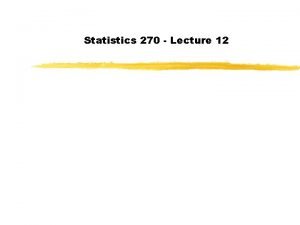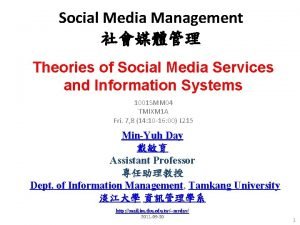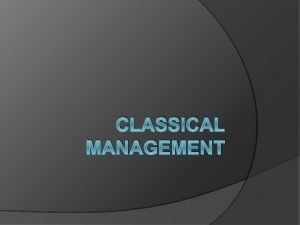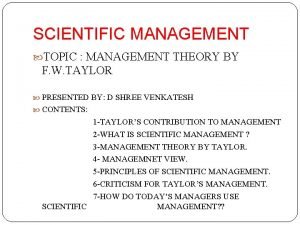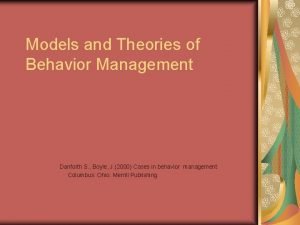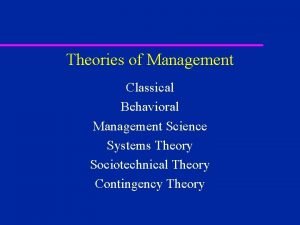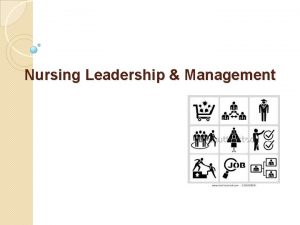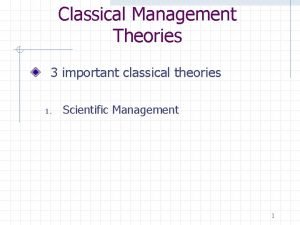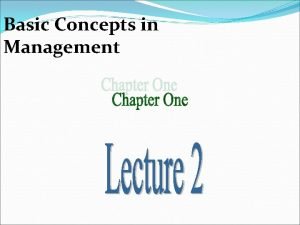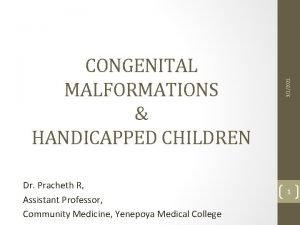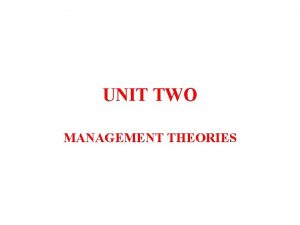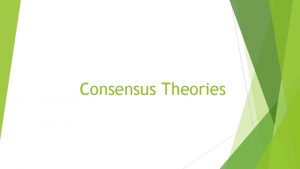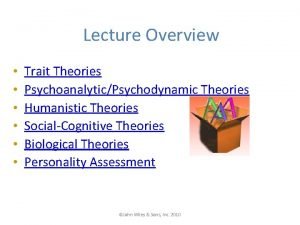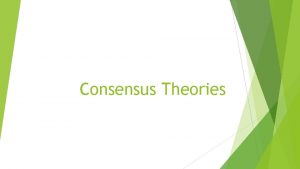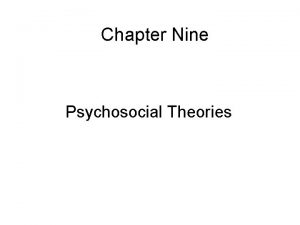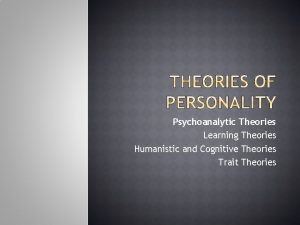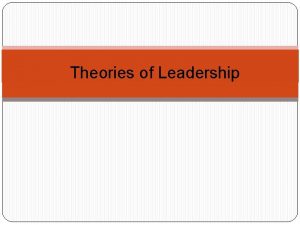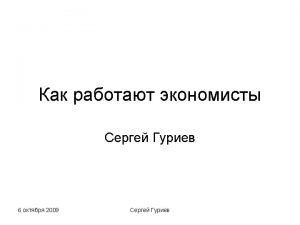MANAGEMENT THEORIES Ms Savitha Assistant Professor Yenepoya College
























- Slides: 24


MANAGEMENT THEORIES • Ms. Savitha • Assistant Professor • Yenepoya College of Nursing • Date : 13/02/2019 • • Peer reviewed by: Mr. Anand Assistant. Professor Community Health Nursing

Learning objectives • Introduction • Definition • GENERAL MANAGEMENT THEORIES v. Scientific Management theory v. Administrative Management HENRI FAYOL v MAX WEBER Bureaucratic Theory

• FEATURES OF BUREAUCRACY • ELTON MAYO Behavioural Theory

DEFINITION • Management theories are the set of general rules that guide the managers to manage an organization.

GENERAL MANAGEMENT THEORIES • 1. Frederick Taylor – Theory of Scientific Management • 2. Henri Fayol – Administrative Management Theory • 3. Max Weber - Bureaucratic Theory of Management • 4. Elton Mayo – Behavioural Theory of Management ( Hawthorne Effect ) • 5. Theory X and Theory Y Management theory Mc. Gregor

Scientific Management theory/ Classical Management theory • Frederick Taylor , America 1856, is recognised father of scientific management. • Aimed at improving economic efficiency, especially labour productivity.

Cont. . . • Taylor had a simple view about what motivated people at work - money. • He felt that workers should get a fair day's pay for a fair day's work, and that pay should be linked to the amount produced.

The effect of Time and motion study Cont. . . • Study the way jobs are performed and find new ways to do them. • Teach , train and develop the workman with improved methods of doing work. • Codify the new methods into rules.

Cont. . . • Interest of employer & employees should be fully harmonized so as to secure mutually understanding relations between them. • Establish fair levels of performance and pay a premium for higher performance.

Conclusion • Frederick Taylor developed principles: • Company should develop standard method of each job using scientific management. • Worker should be selected for job based on skills and abilities • Trained and developed workforce. • Incentives should be offered to encourage the workers.

Administrative Management HENRI FAYOL • Henri Fayol known as the FATHER OF MANAGEMENT • He laid down the 14 principles of Management. • Henri Fayol was born in France in 1841. • Fayol was a mining engineer. • He wanted managers to be responsible for more than just increasing production.

Fayal's five duties of management were as follows • Foresight: Create a plan of action for the future. • Organization: Provide resources to implement the plan. • Command: Select and lead the best workers through clear instructions and orders.

Cont. . . • Coordinate: Make sure the diverse efforts fit together through clear communication. • Control: Verify whether things are going according to plan and make corrections where needed.

Cont. . . • These duties evolved into the four functions of management: • Planning (foresight) • Organizing (organization) • Leading (command coordinate) • Controlling (control).

Cont. . • Fayol’s principles are still included in management theory and practice • Scalar chain: An unbroken chain of command extends from the top to the bottom of the organization.

Cont. . . • Unity of command: Employees receive orders from only one superior. • Unity of direction: Activities that are similar should be the responsibility of one person. • Division of work: Workers specialize in a few tasks to become more proficient.

Conclusion • The work of Fayol forms the basis of management theory and practice still in use today. • Fayol’s duties of management help us understand the functions of managers in any type of organization.

MAX WEBER Bureaucratic Theory • Weber was born in Germany in 1864. sociologist. • He during the time when industrialization was transforming government, business, and society. • Weber was interested in industrial capitalism, an economic system where industry is privately controlled and operated for profit.

Cont. . . • level controls the levels below and is controlled by the level above. • Authority and responsibilities are clearly defined for each position. • Division of Labour tasks are clearly defined and employees become skilled by specializing in doing one thing.

Cont. . • Formal Selection Process Employee: selection and promotion are based on experience, competence, and technical qualification demonstrated by examinations, education, or training.

FEATURES OF BUREAUCRACY • • 1. Division of Labour 2. Formal Hierarchical Structure 3. Selection based on Technical Expertise 4. Management By Rules 5. Written Documents 6. Only Legal Power is Important 7. Formal and Impersonal relations

Cont. . • According to Max Weber, there are three types of power in an organization : - • Traditional Power • Charismatic Power • Bureaucratic Power Or Legal Power.

Conclusion • Weber’s rules for bureaucracy govern most large organizations, from multinational organizations to armies, hospitals, and universities.
 Kidney biopsy
Kidney biopsy Yenepoya physiotherapy college
Yenepoya physiotherapy college Yengage
Yengage Promotion from associate professor to professor
Promotion from associate professor to professor Fok ping kwan
Fok ping kwan A college professor never finishes his lecture
A college professor never finishes his lecture Office management assistant psc
Office management assistant psc Media naturalness theory
Media naturalness theory Theories of modern management
Theories of modern management Canter model of classroom management
Canter model of classroom management Classical management theory
Classical management theory F.w. taylor contribution to management
F.w. taylor contribution to management Behavior management theories
Behavior management theories Behavioral theories of management
Behavioral theories of management Cultural constraints in management theories
Cultural constraints in management theories Nursing leadership theories and styles
Nursing leadership theories and styles Classical management era
Classical management era Management models and theories
Management models and theories Constraints on managers
Constraints on managers Asd college college readiness program
Asd college college readiness program Early college high school at midland college
Early college high school at midland college Scientific management
Scientific management Top management middle management first line management
Top management middle management first line management Top management middle management first line management
Top management middle management first line management What are writing conventions
What are writing conventions





